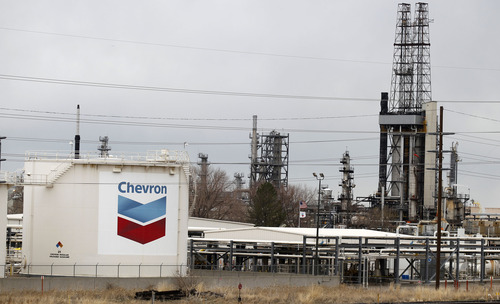This is an archived article that was published on sltrib.com in 2013, and information in the article may be outdated. It is provided only for personal research purposes and may not be reprinted.
Chevron has agreed to pay $384,000 in penalties for pollution violations at its Salt Lake City refinery.
Under a settlement announced Wednesday by the U.S. Environmental Protection Agency, the company will pay $284,000 in fines and buy four new compressed-natural-gas school buses for the Jordan School District that will cost about $25,000 each.
"It is critical that companies conduct business responsibly and obtain the proper permits before making infrastructure changes that increase emissions of air pollutants," said Mike Gaydosh, director of EPA's enforcement program in Denver. "This settlement will help ensure the company is operating in accordance with industry standards to protect the environment and the health of local communities."
Inspectors for EPA and the Utah Division of Air Quality discovered about five years ago that the company ran the refinery's Fluid Catalytic Cracker Unit differently than expected, prompting numerous violations of the federal Clean Air Act. That altered operation led to what the agencies allege were excess nitrogen oxide emissions, which contribute to Utah's summer and winter pollution problems.
Chevron spokesman Greg Hardy noted that the company did not admit liability or guilt as part of the settlement.
"The refinery did not exceed its permit limits for [nitrogen oxide] emissions," he said, pointing out that the EPA contended the way Chevron operated the plant meant unexpected emissions.
Utah's top air-quality official, Bryce Bird, said the settlement also requires the company to overhaul and install pollution controls on three engines at the refinery. That will help make up for the excess pollution of the past by reducing nitrogen oxide emissions by around 50 tons per year.
"It certainly will help," he said, as the state develops its long-term plan to clean up key pollutants behind winter smog events — a plan that must be in place by the year's end.
The impact will be felt most in communities near the refinery at 2351 N. 1100 West, where significant minority and low-income populations live.
Plus, the new school buses also will have practical impacts on health. By using the CNG buses, more than 200 students won't have to breathe diesel pollutants in-cabin and an estimated 6,338 gallons of diesel fuel will be saved each year.
The consent decree was filed in U.S. District Court in Salt Lake City.
Twitter: @judyfutah



